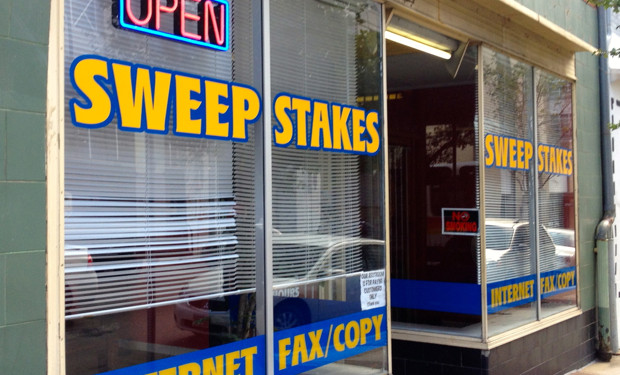Video Sweepstakes Try to Stay Ahead of the North Carolina Legislature
Gambling has long been a problem faced throughout the United States. Although outright gambling has been banned almost everywhere, new forms of gambling continue to pop up. One of the more recent manifestations is the advent of the Internet sweepstakes. Internet sweepstakes have grown in popularity in North Carolina over the last five to ten years, and the North Carolina General Assembly has made repeated attempts to stop the spread and use of these gambling operations. At its most basic level, an Internet sweepstakes involves the sale of Internet or phone time to customers. In exchange for purchasing time to use the Internet or phone, customers are also entered into a sweepstakes. The customer is given a card or token and gains access to a terminal to see whether they have won a prize by playing a game, typically of a casino style such as poker.
In its first attempt in 2006, the North Carolina General Assembly outlawed video poker machines and other types of video gambling. Internet sweepstakes reacted, and changed their sweepstakes’ outcomes to make them predetermined. Instead of using actual video poker, they had simulated games, which kept the casino theme of the earlier games. The General Assembly tried again in 2008, outlawing simulated video gambling as well. Again, the sweepstakes adapted and stopped their use of casino style themes altogether.
Finally, in 2010, the legislature enacted a wider reaching ban on electronic sweepstakes. The new law, N.C.G.S. § 14-306.4, outlawed the use of electronic machines “to conduct a sweepstakes through the use of an entertaining display.” The law defines “entertaining display” as being any real or simulated gameplay, and includes a provision stating its intent to “prohibit any mechanism that seeks to avoid application of this section through the use of any subterfuge.” The constitutionality of the law has been argued in all three levels of the judicial system in North Carolina. A trial court in Guilford County originally ruled that all aspects of the 2010 law were constitutional, except for a broad catchall provision that was deemed overbroad. On appeal, the North Carolina Court of Appeals ruled that the entire law was overbroad. The majority reasoned that the video games and the displaying of sweepstakes results were protected speech, and the state appealed.
The Supreme Court of North Carolina heard arguments on the issue on November 12, 2012, and delivered its opinion on December 14, 2012. The Court found that the law regulates conduct and not speech, and is therefore constitutional. In its opinion, the Court commented on a number of decisions at both the federal and state level dealing with Internet sweepstakes. Those cases included evidence that showed an astounding amount of the Internet and phone time bought in these businesses went unused. One of the records indicated that 99.7 percent of the Internet time purchased went unused. Many of the rulings in other courts focused on this fact, and thereby ruled that the sale of Internet and phone time was merely a pretext for the playing of the sweepstakes and was therefore gambling. However, the record in front of the Supreme Court did not include any such evidence in North Carolina.
The North Carolina Court deemed N.C.G.S. § 14-306.4 an exercise of the state’s police power in protecting the morals of the public at large. The Court’s analysis then turned to whether the law regulated speech or conduct, and the Court deemed that the law regulates conduct because it prohibits the operation or placing into operation of an electronic machine. The Court stated, “Operating or placing into operation an electronic machine is clearly conduct, not speech.” The Court then dealt with the potential issue of the regulated conduct unduly burdening the freedom of speech. Using the O’Brien test espoused by the United States Supreme Court for determining whether the regulation of conduct overly burdened speech, the Court found this regulation of conduct did not overly burden speech. The Court found that the State’s police power included the power to regulate gambling, and that the state’s interest in doing so was substantial. The Court further found the state’s interest in regulating gambling was unrelated to speech, and that the restriction imposed was no greater than necessary to further the State’s interest in regulating gambling.
January 3, 2013, was the first day law enforcement officers could charge those operating sweepstakes under N.C.G.S. § 14-306.4 for criminal offenses. By this date, some operating sweepstakes throughout the state had ceased operation, but many had simply changed their software again in hopes of skirting the law and avoiding criminal charges. The software has been changed to immediately show whether someone has won or lost, and does not include any games or so called “entertaining displays.” This new approach has not yet been deemed illegal, and has kept many of the businesses open. Makers of the software have also been trying to find a sponsor for a bill that would freeze the 2010 law for up to three years so that the sweepstakes could be better investigated and regulated.
Several cities and towns have tried to take on the sweepstakes themselves. Raleigh currently has 31 sweepstakes businesses and its city council has discussed placing distance regulations to prevent multiple sweepstakes from operating too closely together. Other towns face similar dilemmas. All cities and towns tax businesses that run sweepstakes, but the sweepstakes have continuously been cited as a place for the poor and unemployed to gamble away what little money they have. Time will tell whether the Supreme Court of North Carolina’s ruling in Hest Technologies and the acts of the General Assembly can actually stop the Internet sweepstakes businesses in North Carolina.

